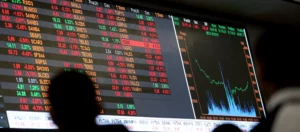For the fifth consecutive session, the Brazilian stock market recorded a decline, closing down 0.75% at 124,388.62 points.
This marks the first five-day loss since late October 2023. Concurrently, the commercial dollar rose by 1.64% to R$5.26, even hitting R$5.28 briefly.
The market’s mood was influenced by the government’s decision to adjust the primary fiscal target from a 0.5% GDP surplus to zero for the next year.
Eduardo Moutinho from Ebury Bank voiced concerns about the exchange rate’s inflationary effects, suggesting Brazil’s Central Bank might intervene to prevent further devaluation of the real.

Notably, the government has rarely intervened in the exchange rate, except for a specific swap auction earlier this month.
Wall Street saw fluctuations but ended higher, supported by positive reports from banks like Bank of America and Morgan Stanley.
U.S. industrial production rose in March, showcasing economic resilience, though this conflicted with the tighter monetary policies expected by the Federal Reserve.
Chairman Jerome Powell indicated that recent high inflation data suggests a longer road to achieving the 2% target.
Tensions between Iran and Israel continue to strain European markets.
ECB President Christine Lagarde mentioned that easing monetary policies could be near if the disinflation process meets expectations.
In Brazil, fiscal challenges grew with the recent fiscal target revision, according to Minister Simone Tebet, who emphasized ongoing commitment to fiscal responsibility and efficient spending.
Despite broader market struggles, not all sectors declined. Petrobras rose by 0.46%, contrasting with falling oil prices globally, and retail stocks generally saw gains.
The real estate sector, led by MRV with a 2.34% increase, followed strong operational results.
Looking forward, the IMF has revised Brazil’s 2024 growth forecast to 2.2%, potentially boosting market sentiment.
Investors now await the February IBC-BR data, hoping it might spur economic momentum.

